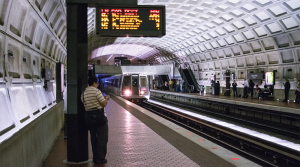
The Metrorail system will not be closed for six months at a time for maintenance and repairs, Washington Metropolitan Area Transit Authority General Manager Paul Wiedefeld announced at a Congressional House Oversight Hearing for the Subcommittee on Transportation and Public Assets held April 13.
The subcommittee is an investigative body that has oversight jurisdiction over multiple federal departments, including the Department of Transportation, the Department of Housing and Urban Development and the Transportation Security Administration.
At the hearing, Wiedefeld stated that WMATA is currently considering alternatives to a complete months-long shutdown.
“We are working to prepare that plan and will present it to you and the public in the next four to six weeks,” Wiedefeld said.
Wiedefeld said the plan may include limiting rail schedules to allow for overnight work, only closing certain sections of the systems between stations at a time and specifying which lines require attention first.
Wiedefeld’s statement came after the public backlash in light of Metro Board Chairman Jack Evans’ (D-Ward 2) March 30 suggestion of a potential six-month long shutdown.
Drew Morrison, senior legislative aide for chairman of the Council of Governments for the D.C. metropolitan area Roger Berliner, said WMATA is facing both large-scale and small-scale issues, ranging from train reliability to public safety at stations.
“There are both micro- and macro- scale issues that Metro is facing,” Morrison said in an interview with The Hoya. “The issues they face are ensuring the public that they can provide a reliable and safe service to the public.”
According to Morrison, the weekend track work WMATA currently does is burdensome for riders and ineffective at fixing issues.
“The way we do maintenance now on the system is that we do these weekend partial shutdowns,” Morrison said. “It just inconveniences folks but still doesn’t get a huge amount of work done.”
Instead of closing entire tracks of the Metrorail system for months at a time, Morrison said WMATA intends to focus on specific areas for extended repair, which might result in limited shutdowns.
“There may be certain places where you’d have to do that in a targeted way in a short duration,” Morrison said. “The general manager has made pretty clear to us that he does not want to have months and months of shutting down a line.”
WMATA has also faced funding problems, which Wiedefeld testified to at Wednesday’s hearing, stressing the agency’s need for more funding to effectively maintain and upgrade its systems.
“Our financial systems as a whole are substandard compared to other transit authorities and require continued efforts to modernize,” Wiedefeld said.
Morrison agreed, emphasizing that WMATA’s financial issues could be partially attributed to a decline in ridership caused by a lack of customer confidence in Metro reliability and the advent of new transportation options, such as Uber.
“Some of that ridership loss is due to those first issues of not being able to provide a reliable service,” Morrison said. “If they don’t have enough riders, they may have funding challenges and have to consider cutting service or increasing fares.”
The majority of WMATA’s $1.8 billion operating budget currently comes from the local governments of Washington, D.C., Virginia and Maryland.
WMATA Chairman Jack Evans (D-Ward 2), who testified alongside Wiedefeld, asked the subcommittee for an additional $300 million in federal funding to match the amount state governments contribute. If approved, the request would give the agency the most expensive operating budget in the country.
“We need $300 million from the federal government,” Evans said at the meeting. “Each jurisdiction is giving that. The federal government needs to do that as well.”
Chairman of the Transportation and Public Assets Committee Congressman John Mica (R-Florida) denied Evan’s request for more funding, stating that WMATA required better leadership, rather than an enlarged budget, at the congressional hearing.
“I am not going to bail you out,” Mica said. “We don’t have leadership. We don’t have management, and these people need to step up to the plate.”
According to Morrison, WMATA is unlike other public transportations systems, as it is not funded by a consistent revenue source and instead must request grants each year from state and federal governments
“We are unique among public transit systems in the United States in that there is no dedicated tax that goes to Metro,” Morrison said. “That means every year, WMATA has to go back and ask for the money instead of having a stream of revenue that they can rely on.”
Kevin Perez (SFS ’19) defended WMATA’s reliability, but highlighted the convenience of alternative modes of transportation, including the Georgetown University Transportation Shuttles bus.
“Generally every time I have taken the Metro, it’s been a reliable service,” Perez said. “The only reason I have converted from using the Metro more frequently to using the GUTS bus is that the GUTS is generally even more convenient.”
George Donaldson (MSB ’18) said he has had primarily positive experiences riding Metro.
“I have never had a problem with the Metro, I think it is pretty nice,” Donaldson said. “In my person opinion, I really like the Metro.”
However, Michael White (COL ’19) critiqued WMATA’s recent performance, specifically pointing to the unprecedented 29-hour-shutdown of all D.C. Metro lines March 16.
“I am disappointed with the Metro and how lately, things have just not been going right — all these shutdowns and all that. That is very disappointing,” White said.




















